My content is reader-supported by awesome people like you. Which means I could earn a commission. Learn more here!
A well-customized eCommerce requires benchmarking strategies that distinguish its operations from another.
Such techniques contain a series of tools necessary to analyze, compare, predict, and accumulate sales to offer a competitive advantage.
Similarly, Weebly or Shopify plays the role of providing functional tools for running eCommerce tools.
Intuitively, Weebly and Shopify compete to offer the best version of the tools to position their users at a competitive edge.
Consequently, some users resonate fully with Weebly, and others find Shopify fascinating.
This article offers a comparative analysis of Weebly vs Shopify to help distinguish which is the best pick for running an eCommerce store.
In a nutshell, the comparative overview explores the ease of the setup process, their built time, pricing, design, templates, advantages, and disadvantages.
A further breakdown of the information is present in the subsections below.
What is Weebly?

Weebly is a self-hosting service provider that allows businesses to customize the available tools and designs to build a free website.
So Weebly enables eCommerce businesses to grow and sell on online platforms.
In a brief history, Weebly was founded by technology gurus, Fanini, and Rusenko in 2007.
The website is currently hosting over 50 million businesses and expanding its offices to meet global demand.
Weebly prides in offering mobile-optimized tools integrated with advanced analytics and marketing tools to catapult eCommerce businesses to higher levels.
What is Shopify?

Like Weebly, Shopify is an online eCommerce platform that houses other businesses to establish and grow online.
Shopify has distinguishable customizable and versatile features that make its operations exceptional and subscribed by millions worldwide.
Weebly started following IT professionals’ dreams, but Shopify was created by three businessmen selling snowboards.
Consequently, Shopify tools and designs display the entrepreneurial mindset powered by numerous features and tools to support online business.
Shopify began operating in 2004, which is earlier than Weebly.
Nevertheless, Shopify continues to experience massive growth extending to over 175 nations and covering more than 1,700,000 stores.
Currently, Shopify is integrating with different mobile platforms to venture more into the global digital markets.
Notably, Shopify partnered with Amazon, Paystack, and Snapchat, which other geographical locations expand its reachability.
Ease of Setting Up Your First Website Weebly and Shopify
Before choosing Weebly or Shopify, it’s imperative to consider which of the two giants has ease of operations.
The section below investigates the ease of setup between Weebly and Shopify.
Setting up your website with Weebly
It’s easy to set up a website using Weebly because of its drag-and-drop functionality.
For the portfolio and small-scale businesses, then Weebly offers a great start.
The Weebly platform is easily customizable, which exempts the business owner from the front-end and back-end hustle.
Generally, what you see on the Weebly template is what you get through dragging and dropping.
Setting up your website with Shopify
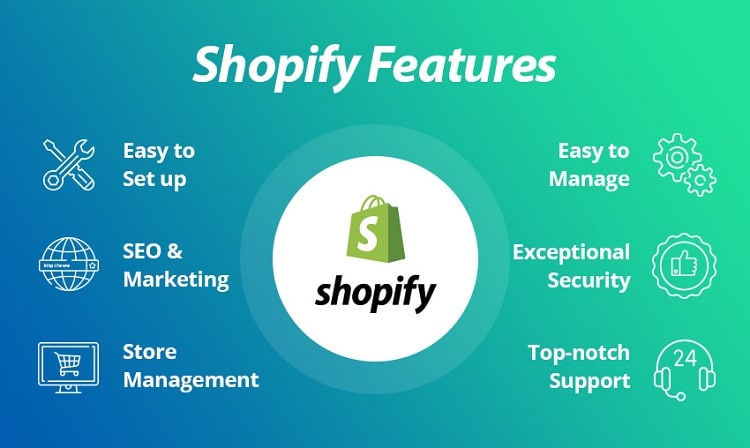
Shopify is very elaborate compared to Weebly.
The eCommerce store builder helps businesses create their account and register the companies to begin operations.
Shopify operates well in a fully functioning store compared to Weebly which merges with portfolio and small-scale start-up.
Some argue that setting up a Shopify store is a long process.
The truth is that the process is straightforward and achievable for people dedicated to harvesting online business.
The only technicality is setting up the store and customizing the company to match user preferences.
It’s a slightly tasking process that requires necessary technical skills.
Plus, Shopify’s technicality is due to its exceptional features, making the stores stand out among the competitors.
Built Time
The ease of setting up an eCommerce business depends on the built time.
A comparison of the two is as below.
Weebly vs. Shopify
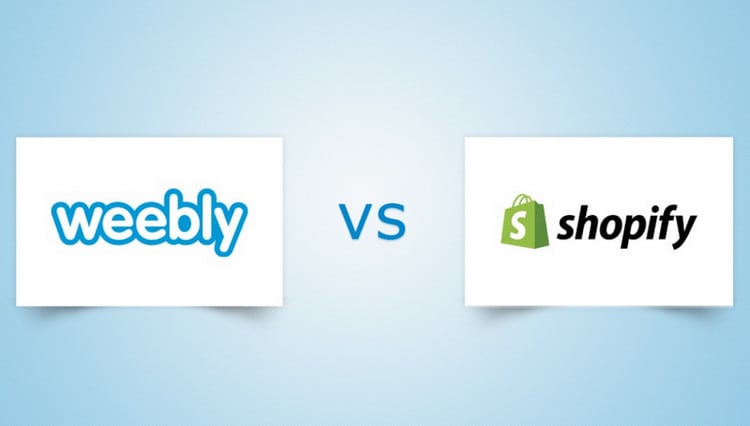
How long you take to set up a store on Weebly vs Shopify depends on the time taken in navigating the website and customizing the themes.
Some website requires plugins and others have many front-end and back-end factors that may take time to start and launch the eCommerce.
Weebly built time is shorter than Shopify since Weebly requires an email address and customizing the themes by dragging and dropping to set up the store.
After signing in, Weebly offers you about 500MB storage and free SSL security to begin operations.
However, selling through the Weebly platform requires a monthly subscription of $ 8.
Shopify does not take online businesses for granted.
The built time is long for the start-up since it requires a business name and well-thought-through ideas.
Also, the user needs to have photos and the product line customized with the available templates.
Similarly, it takes time to add individual products with titles and descriptions.
Again, taking high-quality videos and uploading them is time tasking and requires more time to commission it.
Designs and Templates
Design and template are significant when running an eCommerce website.
A comparative overview of Weebly vs Shopify design and template is as below.
Weebly
Weebly runs in simple templates and designs.
They’re very basic for anyone, even with less technical skills.
However, compared to Shopify, Weebly has slightly low-quality designs but is well-executed and customizable.
Nevertheless, the themes and templates are sharp and helpful in running the online store.
The themes come in 15 different designs and take less time to edit and customize to match personal preferences.
Shopify

As discussed above, Shopify operates in an entrepreneurial mindset, and so the themes are very sophisticated, professional, and high quality for any online business.
If not satisfied with the default design and template, Shopify allows you to acquire more at an extra $140.
Despite the cost, a well-customized Shopify theme and design guarantee better sales since Shopify considers the quality of its services.
Thus, it’s correct to rate the Shopify theme, template, and design significantly higher than the Weebly.
eCommerce Features
The success of an eCommerce business is relative to the quality of its features.
It is imperative to investigate Weebly and Shopify and know which has the best features in this respect.
Shopify features
At Shopify, it’s a guarantee to experience exceptional eCommerce features.
Such features include add-ons, a shopping cart powered by SSL security details, social media integration, Sell in Stores, and abandoned checkout recovery.
Similarly, Shopify offers integrative services for Fulfillment Centres and drop shippers.
Not forgetting a fully customized mobile integration, a full blogging platform, and Search Engine Optimization.
Shopify eCommerce features also include a customizable domain name, more than 100 professional themes, coupons, discount codes, and product reviews.
Weebly features
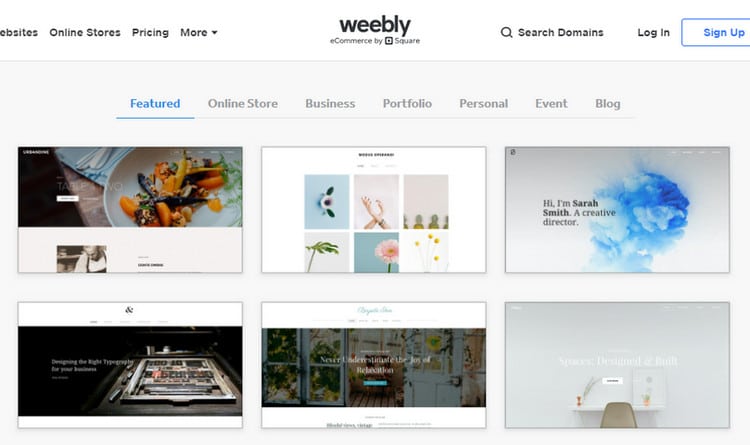
Weebly offers exceptional storefront themes and well-customizable spaces for new product categories.
Further, eCommerce services include a variety of payment getaways, such as Paypal and Stripe.
Individuals have access to a flexible layout and design process that helps in creating successful websites.
The user reaps the benefits of order management, payment processing, and shipping configurations.
Weebly features come with an exceptional product creation platform well-customized designs and performance and exporting and importing.
By extension, Weebly offers a blogging system and fully responsive themes for creating unique stores.
In comparison, Shopify offers more sophisticated and achievable commerce features that resonate fully with many businesses.
Also, the Shopify functionality is exceptional and works professionally to create large eCommerce businesses.
Plugin and App Support
An eCommerce website cannot be complete without plugin and App support.
Below is an evaluation of Weebly and Shopify plugins and App support.
Weebly
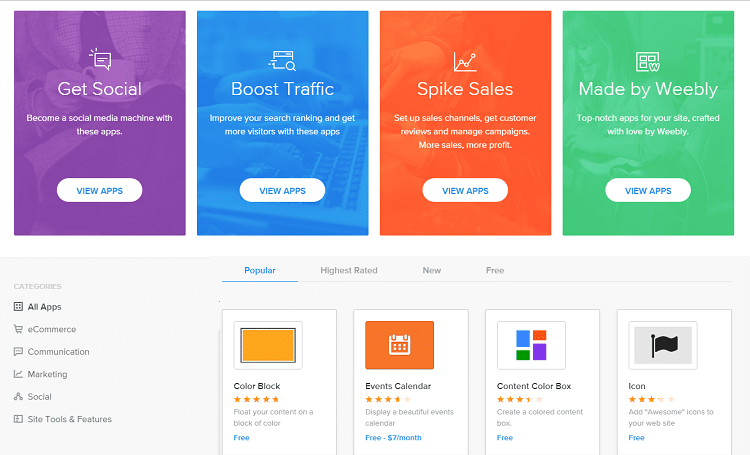
Weebly understands the power of the app center and the plugins.
All the features are housed in the Search 360 plugin, which helps increase convenience, deliver fast, and provide trustworthy search functionality.
The Weebly plugin also allows secure third-party integrations that help in fast response, keeping a calendar of events and Facebook-like features.
Similarly, Weebly continues to supply users with more customizable applications available in the App Centre.
It’s easy and convenient to upgrade and improve the quality of eCommerce.
Shopify
When it comes to plugins and App Store, Shopify bags the price, the Shopify App Store is robust with more than 200 applications for the users to choose from.
Ideally, Shopify has limitless solutions and the range of application help in customizing the stores by improving the selling features.
Shopify App Store is all about the consumers’ convenience with more emphasis on communication and response rate.
So Shopify offers a platform for consumers to review and provide feedback about the products and the services.
Also, there’s more on customer privacy, geolocation, point of sale, and local delivery.
The business owner can add or remove the plugin depending on their liking.
But Shopify leads in digital download, platforms for a business chat, and more advanced features that come at a price.
Payment Support
Payment support is essential for an eCommerce enterprise.
The following is the guide on the best payment support between Weebly and Shopify.
Weebly
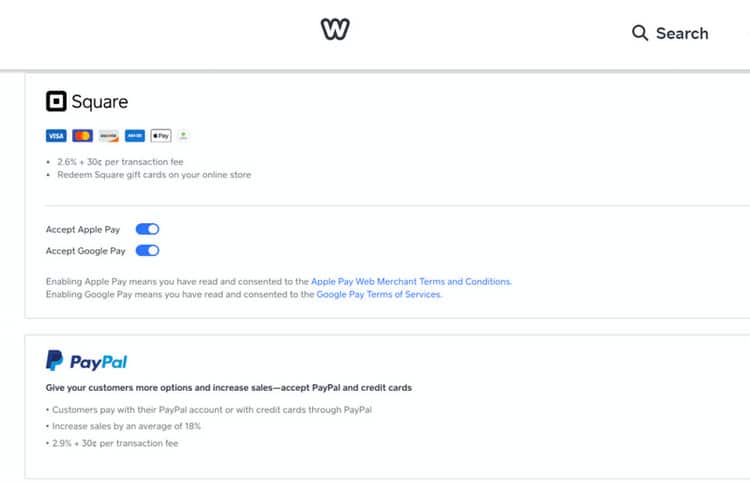
Weebly allows its users to accept online payment through major payment options such as Square and Authorize.net.
Also, Weebly supports Stripe which runs in 11 countries, and PayPal in 25 countries.
The shipping information is well managed, and the website offers real-time order reporting, return processing, refunds shipment notifications, and confirmation emails.
Shopify
Shopify is more diverse and includes third-party payment options.
Similarly, the Shopify platform supports Webpay, Stripe, Shopify Payment, Quick Pay, ePay, Cyber Source, BluePay, PayPal, Amazon Pay, and Authorize Net.
Notice that Shopify has present in all countries and has customizable features that integrate with the various payment options.
Customer Support Weebly and Shopify
Customer support is critical in any eCommerce business since it’s the backbone for quality services.
Therefore, below is the evaluation of which eCommerce offers the best customer support, Weebly vs Shopify.
Weebly customer support
Weebly support is available on weekdays and weekends.
For the weekdays, Weebly offers customer support for 12 hours a day and 9 hours a day for the weekends.
For premium customers, it’s possible to contact support through a phone call directly.
Similarly, Weebly has an instant Help Center where customers search for their problems and access valuable responses through the Weebly communities.
Also, the blog section offers solutions, guidelines, and support for using Weebly products.
Shopify customer support

Shopify offers a better customer support package.
The website allows all forms of support for the customers and extends to email contacting for severe queries.
A phone call is also available and extends to countries such as Indonesia, Singapore, New Zealand, India, Australia, Malaysia, the United Kingdom, and North America.
Weebly vs. Shopify Cost
Below is a Weebly vs Shopify pricing breakdown.
Weebly pricing breakdown
Weebly considers the starters and pioneers in the business.
Thus, the pricing breakdown into five plans, namely: performance, business, pro, starter, and the free program.
For starters, they pay a subscription fee of $8 every month, while the unlimited access to storage, pages, and various tools, the pro plan comes at $12.
The business plan charges $25 for unlimed functionalities such as storage, product elements, and pages.
Further, the business plan covers the SSL certificate, integrated coupon codes, inventory management, and digital goods.
Finally, the performance plan charges $38 every month and above others.
It includes five months of campaigns, digital gift cards, automated emails, real-time shipping rates, and email marketing.
Shopify pricing breakdown
Shopify operates the business in three specific plans— advanced Shopify, Shopify, and basic.
Advanced Shopify charges $399 every month, Shopify charges $105, and basic goes for $39. For every plan, you will benefit by securing:
- 24/7 support
- Free transactions fees for the Shopify payment plan
- Alert tools and fraud analysis
- POS at checkouts
Domain and Hosting
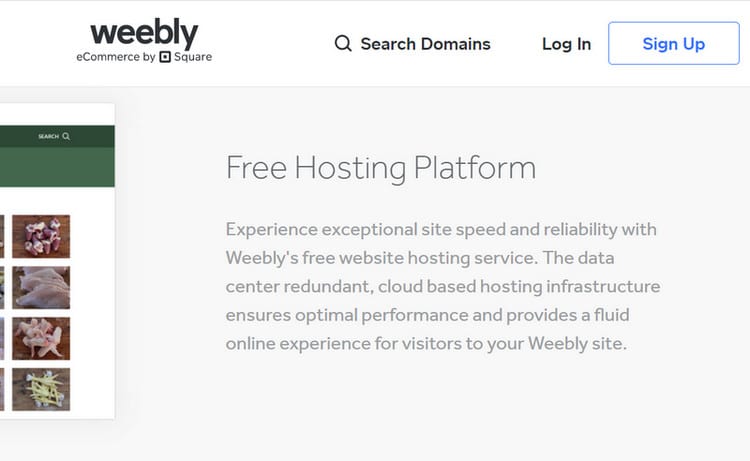
Weebly offers free hosting services supported in the cloud.
The service is scalable and aims at supporting huge traffic websites.
Also, Weebly extends its domain names to include .info, .us, .net, com, And .org.
Shopify starts with free subdomains to serve the different needs of eCommerce businesses.
The free subdomain aims to separate the primary domain from the storefront domain.
It transfers the eCommerce businesses to Debian Linus Serves, whose security is on OpenBSD firewalls.
Also, the hosting comes with an advantage at the MySQL databases.
Also, Shopify offers custom domain options for premium customers.
The website has more than 50 custom domains to choose from, and each comes with a personalized name.
To purchase a Shopify domain comes at a free year registration, and the full cost is $14 every year.
The user gets the advantage of WHOIS privacy and email forwarding.
Pros and Cons
Weebly Pros
- It’s a drag-and-drop website, which makes it easy to customize features on the platform.
- Weebly plans have a better free option that is conducive for a starter.
- The website contains a lot of free themes
- The free accounts get the advantage of Google Adwords advertising.
- The Weebly platform easily integrates with mobile applications allowing space for store management, selling, and editing.
- It’s easy to manage upgrading and downgrading.
- The plans are cheaper compared to Shopify.
Weebly Cons
- Users depend on premium templates and themes, which are a bit expensive.
- The platform is highly restricted
- The transactions charges are relatively high
- Fewer blog options
Shopify Pros
- The platform has a range of services and features.
- Shopify is speedy and secure
- The platform has the best marketing and analyzing tools
- It’s easy to run the store through the Shopify store
- The customer support is excellent.
- High compatible with third parties and other add-ons
Shopify Cons
- Highly reliant on add-ons and third-party applications
- The initial setup is very complicated for users without basic IT skills.
- The pricing schedule is a bit expensive, while the processing process is an additional payment.
Weebly vs. Shopify Conclusion
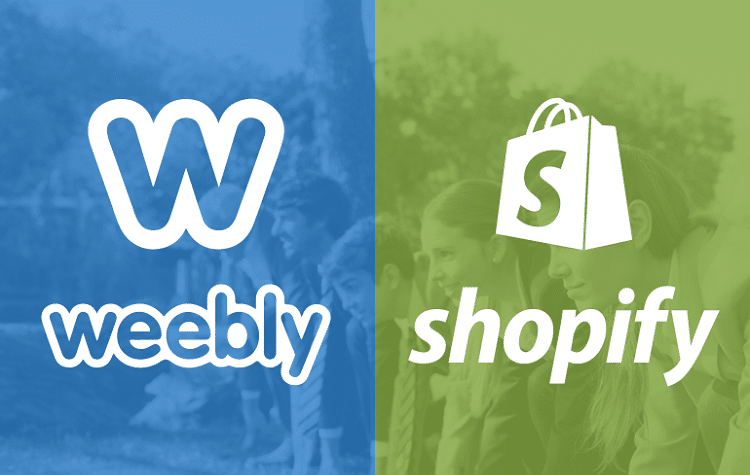
Shopify has superior eCommerce features compared to Weebly, and it’s easy for a start-up to start from free trial to advanced levels with growth and excellence.
Shopify requires patience and basic IT skills to navigate the website and customize the features to fit the e-commerce preferences.
Weebly has many limitations and, therefore, is not very conducive for a business targeting to grow.
Shopify has fewer restrictions and comes with exceptional features for the quality of the design and the templates.
Similarly, Shopify offers a range of payment options that integrate with many states.
In this respect, Shopify is better than Weebly all way from hosting, domain selection, payment, support, pricing breakdown, and AppStore.
For more advanced features, Shopify offers at premium rates, which comes as an advantage for macro businesses.
Weebly is not that weak in eCommerce functions, but Shopify supports the entrepreneurial mindset and is thus very applicable for business.
Weebly vs Shopify, which is best for your eCommerce business?
What are the features to support and not support the specific eCommerce store builders?
It’s you to decide the best you will use.





Leave a Reply